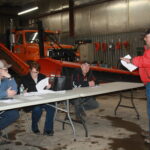Who’s driving your car and are they covered?
PRESQUE ISLE, Maine – If you loan your car to a friend or family member, are you sure that your auto policy will cover them if they get into an accident?
“One of the most common confusions among auto owners who loan their car to another person is whether they legally are responsible for actions or damages that occur when their friend or family member is driving their car,” said Calvin Deschene, manager of the Hayden-Perry Insurance Agency in Presque Isle.
The short answer is the owner of the car is primarily liable, and in most cases, his or her auto insurance should take care of liability and damage claims.
When the owner of a car purchases auto insurance – whether voluntarily or when required by law – the policy’s liability coverage applies to any person using that car with a reasonable belief they are entitled to do so.
For example, if a person borrows an SUV to move a card table and causes an accident, the SUV owner’s auto liability coverage will provide primary coverage. That policy will pay up to its limit for claims of bodily injury and/or property damage.
“Once the owner’s auto liability limits are exhausted, the auto liability coverage of the borrower would cover the remaining liability,” said Deschene.
But there are several reasons why this shared-liability approach may not always work out.
“First, when people let others borrow their car, they don’t always ask whether the borrower has auto insurance. This can become a major problem if you lend your car to someone with little or no auto insurance,” Deschene said. “If the limits of liability of your policy and that of your friend or family member are low, both policies combined may not fully cover a serious accident. This likely would end up with you having to defend yourself in a costly lawsuit.
“It is possible for an accident to exhaust the auto policy’s limits of liability; especially if the policy limits are low; most states only require a minimum amount of auto liability coverage,” he said. “Higher liability limits are always recommended.”
Depending on the circumstances contributing to an accident, the loss may be excluded by your auto insurance policy. For example, if the person who borrows your car decides to race a Mustang and causes a serious accident, exclusions for racing may prevent yours and the driver’s auto liability policy from providing coverage.
“Before loaning your car, be 100 percent sure your friend or family member has auto insurance and he or she has adequate liability limits. If not, just say ‘No!’” said Deschene. “It may be wiser for you to chauffer your friend around town. Sure it sounds inconvenient, but when you consider the potential liability you could face if your friend is in an accident while driving your car, it’s a far-better and less costly alternative.”
Hayden-Perry Insurance Agency, located in Presque Isle, was established in 1889. The agency became part of the United Insurance Group, which was founded in 1976. The United Insurance Group brought together several independent insurance agents to provide comprehensive business and personal insurance. It provides precisely tailored coverage for their clients and immediate claims service with particular focus on the state of Maine and its insurance needs. The United Insurance Group has 13 members and 15 locations throughout Maine.
Tips for getting around safely in winter
Looked at a calendar lately? Time sure is flying! It seems like just yesterday you were enjoying those long, sunny days out by the lake. Now you’re counting down the days till Thanksgiving and Christmas; but the holidays aren’t all you should be thinking about. The most wonderful time of the year is also the most dangerous time of year to be on the roads.
According to the AAA, loss of visibility, slick roads and poorly maintained brakes lead to thousands of accidents every year, and the highest number of weather-related injuries and fatalities occur during the wet and snowy months of winter. But there are precautions you can take to help prevent accidents, and to be prepared, just in case.
Now — before the flakes start flying — is the time to winterize your vehicle! Start by making sure it is well maintained and in good working order. Here’s a checklist of things to inspect:
• Check all fluids and replenish if necessary.
• Have your vehicle’s battery checked to make sure it is strong enough to make it through the winter.
• Check tire tread depth and tire pressure; consider special tires if snow or ice are a problem in your area.
• Check to see that all lights work and headlights are properly aimed.
• Be certain the heater and defroster are working properly.
• Change your windshield wiper blades if your current ones are worn or UV damaged to ensure good visibility during the season’s rain or snow storms.
It’s always good to be a defensive driver, but it’s especially important in inclement weather. Good winter driving depends on using common sense and adjusting your driving to weather conditions.
• Keep your gas tank full to minimize condensation, and provide an extra margin of comfort and safety in case of delays.
• Don’t use your cruise control or overdrive when it’s freezing (or colder).
• Trucks take longer to stop, so don’t cut in front of them.
• Don’t get overconfident with four-wheel drive. It helps you get going quicker but won’t help you stop any faster.
• Add weight to the rear of your car or truck for better traction. If you drive a car, add weight to the trunk by using sandbags. If you drive one of the more than 38 million registered trucks on the roads, you should add weight to the truck bed. This can be done with a Line-X Spray-On Truck Bedliner. The liner adds about 50 pounds of weight to deter rear wheel skids. It also provides lifetime protection against the rust and corrosion that can form quickly in winter weather.
Finally, keep emergency supplies in your vehicle. Here’s a list of some items that will come in handy if you’re stranded:
• Basic safety equipment such as emergency cash, scraper and brush, small shovel, jumper cables, tow chain, and bag of sand or cat litter for tire traction.
• A breakdown kit that includes road flares, blanket, gloves, boots, warm clothing, flashlight, extra batteries, food, water, and first-aid kit.
• A CB radio or cellular phone can be a lifesaver for you or another stranded motorist in the event of an emergency or collision.
These tips and a little common sense will keep you and your family safe on the road this winter. For more information on Line-X Spray-On Truck Bedliners, or to find the dealer nearest you, visit www.linex.com or call (800) 831-3232. Line-X has close to 500 locations across the United States. Courtesy of ARAcontent







